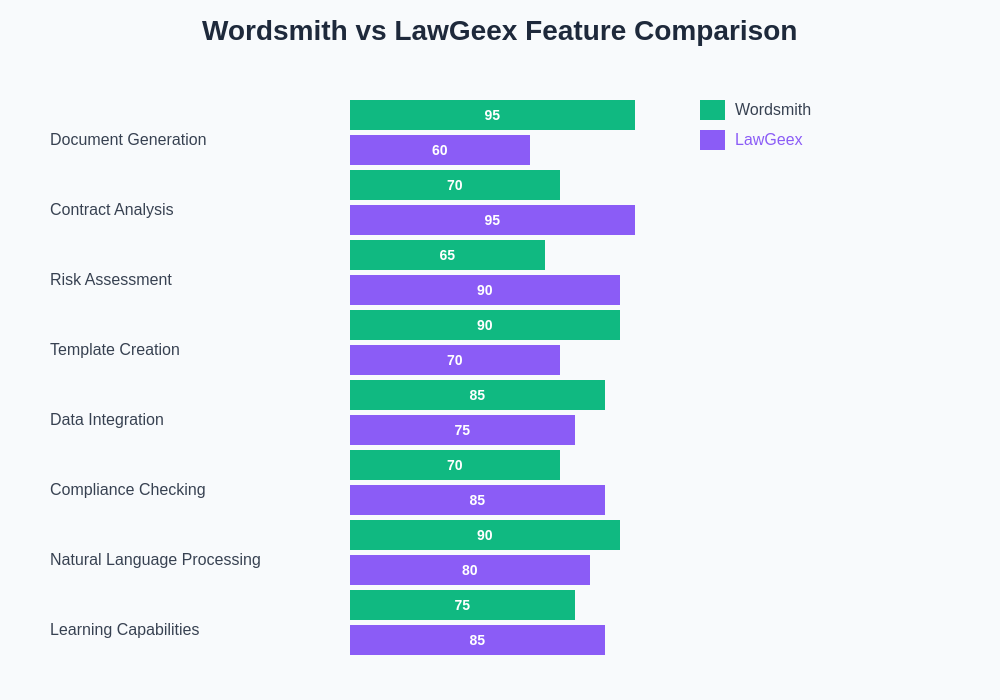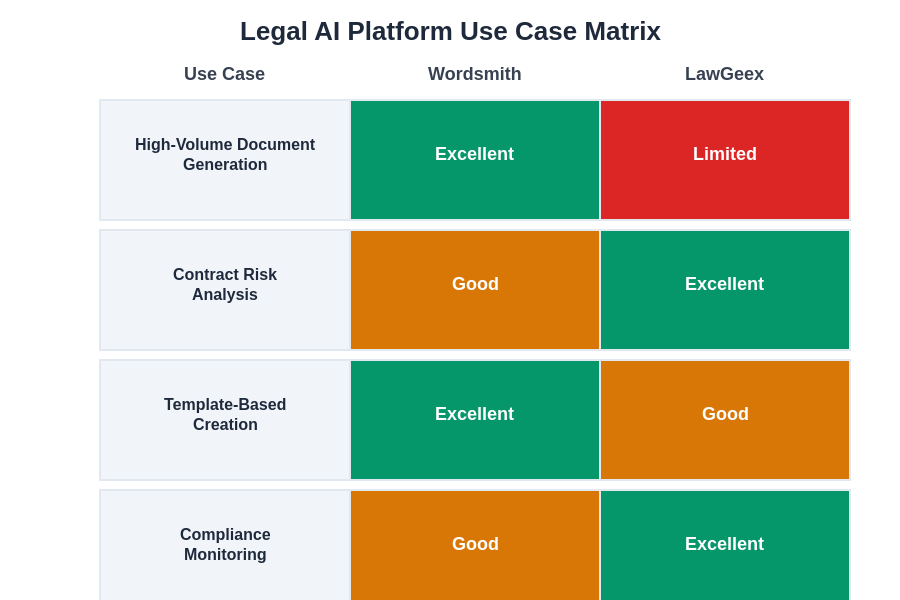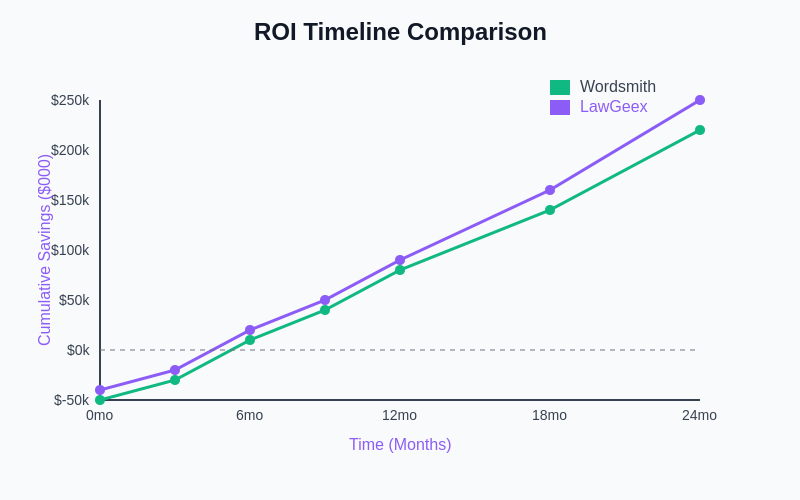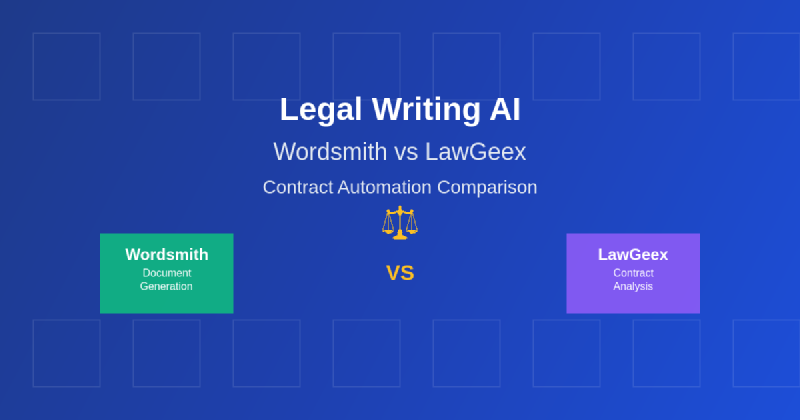The legal industry stands at the precipice of a technological revolution, where artificial intelligence is fundamentally transforming how legal professionals approach document creation, contract analysis, and legal writing. Two prominent platforms leading this transformation are Wordsmith and LawGeex, each offering distinct approaches to automating legal processes and enhancing the efficiency of legal practitioners. This comprehensive analysis explores the capabilities, strengths, and applications of these platforms, providing legal professionals with the insights needed to make informed decisions about incorporating AI into their practice.
Explore the latest AI developments in legal technology to understand how artificial intelligence is reshaping the practice of law and creating new opportunities for legal innovation. The integration of AI into legal workflows represents not merely an efficiency improvement but a fundamental shift in how legal services are delivered, priced, and conceptualized in the modern legal landscape.
The Evolution of Legal Writing Technology
The transformation of legal writing from traditional manual processes to AI-enhanced automation represents one of the most significant developments in legal technology. Traditional legal writing has long been characterized by extensive research, meticulous drafting, and careful review processes that consume substantial time and resources. The introduction of AI platforms like Wordsmith and LawGeex has fundamentally altered this paradigm by providing intelligent assistance that can analyze complex legal documents, generate sophisticated contract language, and identify potential risks and compliance issues with unprecedented speed and accuracy.
This evolution has been driven by the legal industry’s recognition that many legal writing tasks involve repetitive patterns, standardized clauses, and predictable structures that can be effectively automated without compromising quality or accuracy. The sophisticated natural language processing capabilities of modern AI systems enable these platforms to understand legal context, maintain consistency across documents, and ensure compliance with relevant regulations and standards.
The impact of this technological evolution extends beyond simple efficiency gains, fundamentally changing how legal professionals allocate their time and expertise. Rather than spending hours on routine document creation and basic analysis tasks, lawyers can now focus on higher-value activities such as strategic legal advice, complex problem-solving, and client relationship management. This shift has profound implications for the economics of legal practice and the value proposition offered to clients.
Wordsmith: Advanced Natural Language Generation
Wordsmith represents a sophisticated approach to legal document automation, leveraging advanced natural language generation capabilities to create comprehensive legal documents from structured data and templates. The platform’s strength lies in its ability to transform complex data sets into coherent, legally sound documents that maintain consistency and accuracy across large volumes of legal content. This capability makes Wordsmith particularly valuable for organizations that need to generate numerous similar documents while ensuring each document is tailored to specific circumstances and requirements.
The platform’s natural language generation engine employs sophisticated algorithms to understand context, maintain appropriate tone and style, and ensure that generated content adheres to legal writing conventions and standards. This technological foundation enables Wordsmith to produce documents that read naturally and professionally while incorporating complex legal concepts and requirements seamlessly. The system’s ability to handle multiple variables and conditional logic makes it exceptionally well-suited for creating documents that must adapt to diverse circumstances and requirements.
Experience advanced AI capabilities with Claude to enhance your understanding of how sophisticated natural language processing can be applied to legal writing and document generation tasks. The integration of advanced AI reasoning into legal workflows creates opportunities for more nuanced and contextually appropriate legal document creation.
Wordsmith’s approach to legal automation emphasizes flexibility and customization, allowing legal teams to create sophisticated templates and rules that govern document generation while maintaining the ability to make real-time adjustments and modifications. This balance between automation and human oversight ensures that generated documents meet specific requirements while benefiting from the efficiency and consistency that AI automation provides.

The comparative analysis of core capabilities reveals distinct strengths and specializations between the platforms. Wordsmith demonstrates superior performance in document generation and natural language processing tasks, while LawGeex excels in contract analysis, risk assessment, and compliance monitoring functionalities.
LawGeex: Contract Analysis and Risk Assessment
LawGeex has established itself as a leader in contract analysis and risk assessment, utilizing artificial intelligence to review legal documents with remarkable speed and accuracy. The platform’s core strength lies in its ability to analyze contracts against predefined legal standards, company policies, and regulatory requirements, identifying potential risks, compliance issues, and areas requiring attention. This capability has proven invaluable for organizations that process large volumes of contracts and need to ensure consistent review standards across their legal operations.
The platform’s AI engine has been trained on extensive databases of legal documents and precedents, enabling it to recognize patterns, identify anomalies, and flag potential issues that might be overlooked during manual review processes. This comprehensive training allows LawGeex to provide detailed analysis and recommendations that help legal professionals make informed decisions about contract terms, risk acceptance, and negotiation strategies.
LawGeex’s approach to contract automation extends beyond simple document review to include intelligent recommendations for contract improvements, alternative language suggestions, and risk mitigation strategies. The platform can identify inconsistencies between different sections of a contract, highlight unusual or potentially problematic clauses, and suggest standardized language that aligns with best practices and company policies.
The system’s ability to learn from user feedback and adapt to specific organizational requirements makes it increasingly effective over time, creating a customized analysis framework that reflects the unique needs and preferences of each organization. This learning capability ensures that the platform becomes more valuable and accurate as it processes more documents and receives more user input.
Comparative Feature Analysis
When examining the core capabilities of Wordsmith and LawGeex, distinct differences emerge that make each platform suitable for different types of legal automation needs. Wordsmith excels in document generation scenarios where large volumes of similar documents must be created with varying data points and circumstances. The platform’s natural language generation capabilities enable it to create comprehensive legal documents that maintain consistency while adapting to specific requirements and variables.
LawGeex, conversely, demonstrates superior performance in document analysis and review scenarios, where existing contracts and legal documents require thorough examination for compliance, risk assessment, and improvement opportunities. The platform’s analytical capabilities provide detailed insights into contract terms, potential risks, and areas requiring attention or modification.
The user experience differs significantly between the two platforms, with Wordsmith focusing on template creation and data input processes that enable efficient document generation, while LawGeex emphasizes document upload and analysis workflows that facilitate comprehensive contract review and assessment. These different approaches reflect the distinct use cases and objectives that each platform addresses.
Integration capabilities represent another area where the platforms diverge, with Wordsmith offering robust data integration features that enable seamless connection to existing databases and information systems, while LawGeex provides strong integration with contract management systems and legal workflow platforms. These integration differences influence how each platform fits into existing legal technology ecosystems and operational workflows.
Discover comprehensive AI research capabilities with Perplexity to enhance your understanding of legal technology trends and make informed decisions about AI platform selection for your legal practice.
Document Generation Capabilities
The document generation capabilities of Wordsmith represent a significant advancement in legal automation technology, enabling legal professionals to create sophisticated documents with minimal manual intervention. The platform’s ability to process complex data inputs and generate coherent, legally appropriate documents makes it particularly valuable for organizations that regularly create similar types of legal documents with varying details and circumstances.
Wordsmith’s template-based approach allows legal teams to create sophisticated document frameworks that incorporate conditional logic, variable content sections, and dynamic formatting based on input parameters. This flexibility enables the platform to generate documents ranging from simple contracts to complex legal agreements that require careful attention to specific terms and conditions.
The platform’s natural language processing capabilities ensure that generated documents maintain appropriate legal tone and style while incorporating necessary legal language and concepts. This attention to linguistic quality distinguishes Wordsmith from simpler template-based systems that may produce technically correct but awkwardly phrased legal documents.
Quality control mechanisms built into Wordsmith help ensure that generated documents meet established standards and requirements, with built-in checks for consistency, completeness, and compliance with relevant regulations and policies. These quality assurance features provide confidence that automated document generation maintains the accuracy and reliability expected in legal practice.
Contract Analysis and Review Features
LawGeex’s contract analysis and review capabilities represent a sophisticated application of artificial intelligence to one of the most time-consuming aspects of legal practice. The platform’s ability to rapidly analyze complex legal documents and provide detailed insights into potential risks, compliance issues, and improvement opportunities has transformed how many organizations approach contract management and legal risk assessment.
The platform’s analytical engine examines contracts across multiple dimensions, including compliance with regulatory requirements, alignment with company policies, consistency with standard terms and conditions, and identification of unusual or potentially problematic clauses. This comprehensive analysis approach ensures that potential issues are identified and addressed before they become significant problems.
LawGeex’s risk assessment capabilities provide detailed scoring and categorization of identified issues, enabling legal professionals to prioritize their attention and focus on the most critical concerns. The platform’s ability to explain its analysis and provide context for identified issues helps legal professionals understand the reasoning behind recommendations and make informed decisions about how to proceed.
The platform’s comparative analysis features enable users to compare contracts against standard templates, previous agreements, or industry benchmarks, providing valuable insights into how specific contracts align with established norms and best practices. This comparative capability is particularly valuable for organizations that need to maintain consistency across multiple contracts and relationships.

The use case matrix demonstrates how each platform excels in different scenarios, with Wordsmith showing particular strength in high-volume document generation and template-based creation, while LawGeex dominates in contract risk analysis and compliance monitoring applications.
Implementation and Integration Considerations
The successful implementation of either Wordsmith or LawGeex requires careful consideration of existing workflows, technical infrastructure, and organizational requirements. Both platforms offer different approaches to integration that must be evaluated in the context of specific organizational needs and constraints. Understanding these implementation requirements is crucial for maximizing the value and effectiveness of whichever platform is selected.
Wordsmith’s implementation typically involves significant upfront work in template creation and data mapping, requiring legal teams to invest time in developing sophisticated document templates and establishing data integration processes. This initial investment pays dividends through improved efficiency and consistency in document generation, but organizations must be prepared for the substantial setup requirements.
LawGeex implementation focuses more on configuration of analysis parameters, risk criteria, and integration with existing contract management systems. The platform’s learning capabilities mean that effectiveness improves over time as the system processes more documents and receives user feedback, but this gradual improvement requires patience and consistent use.
Training requirements differ significantly between the platforms, with Wordsmith requiring more intensive training in template creation and data management, while LawGeex emphasizes training in analysis interpretation and workflow integration. These training differences influence the resources required for successful adoption and ongoing use.
Cost-Benefit Analysis and ROI Considerations
The economic impact of implementing legal AI platforms like Wordsmith and LawGeex extends beyond simple cost reduction to encompass improvements in quality, consistency, and strategic capability. Organizations considering these platforms must evaluate both direct costs and indirect benefits to understand the full financial implications of adoption.
Direct cost savings typically manifest through reduced time requirements for document creation and review tasks, enabling legal professionals to handle larger volumes of work or focus on higher-value activities. The magnitude of these savings depends on the specific use cases and volume of work that can be effectively automated.
Quality improvements represent another significant benefit, as AI platforms can help reduce errors, ensure consistency, and maintain compliance with relevant standards and requirements. These quality improvements can prevent costly mistakes and reduce the risk of legal disputes or compliance issues.
The strategic benefits of AI adoption include enhanced capability to handle complex projects, improved client service through faster turnaround times, and increased competitive advantage through more efficient service delivery. These strategic benefits often justify the investment in AI platforms even when direct cost savings alone might not provide sufficient ROI.

The return on investment timeline reveals that both platforms achieve positive ROI within the first year, with LawGeex typically showing faster initial returns due to immediate efficiency gains in contract review processes, while Wordsmith demonstrates strong long-term value through sustained document generation savings.
Security and Compliance Framework
Security and compliance considerations are paramount when implementing AI platforms in legal environments, where confidentiality, data protection, and regulatory compliance are critical requirements. Both Wordsmith and LawGeex have developed comprehensive security frameworks designed to meet the stringent requirements of legal practice, but organizations must carefully evaluate these frameworks against their specific security and compliance needs.
Data protection measures implemented by both platforms include encryption of data in transit and at rest, secure authentication mechanisms, and comprehensive access controls that limit data access to authorized users. These foundational security measures provide essential protection for sensitive legal information and client data.
Compliance with legal and regulatory requirements represents another critical consideration, with both platforms implementing measures to support compliance with various data protection regulations, industry standards, and professional requirements. Organizations must verify that selected platforms meet all applicable compliance requirements for their specific jurisdiction and practice areas.
Audit and monitoring capabilities provided by both platforms enable organizations to track usage, monitor access, and maintain detailed logs of all platform activities. These audit capabilities are essential for maintaining accountability and demonstrating compliance with relevant requirements and standards.
Future Developments and Market Trends
The legal AI market continues to evolve rapidly, with both Wordsmith and LawGeex investing heavily in research and development to enhance their capabilities and expand their market reach. Understanding the trajectory of these developments helps organizations make informed decisions about platform selection and long-term strategic planning.
Emerging technologies such as advanced natural language processing, machine learning, and predictive analytics are being integrated into both platforms to enhance their capabilities and provide new functionality. These technological advances promise to further improve the accuracy, efficiency, and value of legal AI platforms.
Market consolidation and partnership developments are reshaping the competitive landscape, with platforms increasingly integrating with other legal technology solutions to provide comprehensive legal automation ecosystems. These integration trends influence how platforms fit into broader legal technology strategies and long-term planning.
Regulatory developments and professional standards evolution continue to influence the development and adoption of legal AI platforms, with both platforms adapting to meet changing requirements and expectations. Organizations must stay informed about these regulatory developments to ensure continued compliance and optimal platform utilization.
Strategic Implementation Recommendations
The selection and implementation of legal AI platforms requires a strategic approach that considers both immediate needs and long-term objectives. Organizations should begin by conducting a thorough assessment of their current legal workflows, identifying areas where AI automation can provide the greatest value and impact.
Pilot programs represent an effective approach for evaluating platform capabilities and fit before committing to full implementation. These pilot programs should focus on specific use cases that demonstrate clear value and provide measurable results that can inform broader implementation decisions.
Change management considerations are crucial for successful AI platform adoption, as legal professionals may require significant training and support to effectively utilize new technologies. Organizations should develop comprehensive change management plans that address training needs, workflow modifications, and cultural adaptation requirements.
Performance measurement and optimization frameworks should be established to track the effectiveness of AI platform implementation and identify opportunities for improvement. These measurement frameworks should include both quantitative metrics such as time savings and error reduction, as well as qualitative assessments of user satisfaction and strategic impact.
The integration of artificial intelligence into legal practice through platforms like Wordsmith and LawGeex represents a fundamental shift in how legal services are delivered and conceptualized. Organizations that successfully implement these technologies will gain significant competitive advantages through improved efficiency, enhanced quality, and expanded capabilities that enable them to serve clients more effectively while optimizing their operational performance.
Disclaimer
This article is for informational purposes only and does not constitute legal or professional advice. The comparison of legal AI platforms is based on publicly available information and general market analysis. Organizations should conduct their own thorough evaluation and due diligence before selecting or implementing any legal technology platform. The effectiveness and suitability of AI platforms may vary depending on specific use cases, organizational requirements, and regulatory environments. Legal professionals should ensure compliance with all applicable professional standards and regulations when implementing AI technologies in their practice.
